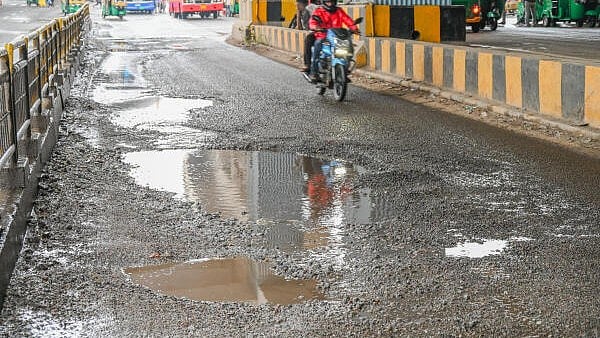
Representative image showing potholes on the road.
Credit: DH Photo/ S K Dinesh
India’s dreams of reversing brain drain may remain just that — dreams. While the political agenda fervently supports the notion, the stark reality on the ground is that Indian cities themselves are a far cry from being attractive enough to retain current talent, let alone lure, skilled professionals back to the country.
Take a moment to step outside the confines of boardrooms and government policies, and you’ll quickly realise why many of India’s brightest prefer the comfort of foreign shores. Our cities, despite rapid growth, still fail to offer a decent quality of life. The streets, riddled with potholes, reflect the apathy that permeates urban development. Roads are more an obstacle course than pathways for commuters. Pavements? They’re a mere afterthought, often hijacked by informal vendors, leaving little room for pedestrians. If one’s vision of a thriving city includes simple pleasures like clean streets and orderly traffic, most Indian cities will fall short.
The bureaucratic labyrinth here remains a formidable barrier. It’s not just about the ease of doing business, it’s about the ease of doing anything. Try acquiring something as straightforward as a death certificate in most cities, and you’re bound to be confronted with the unpleasant reality of ‘cash, thank you’. Corruption is a systemic issue, entrenched at every level of society. Businesses are stifled by an opaque bureaucracy — especially at the grassroots level, poor infrastructure, and a system that seems more interested in extracting their system-fees than fostering innovation. Entrepreneurs don’t just fight market competition; they fight the system itself.
Public infrastructure is not just outdated; it’s embarrassing. Cities are clogged with traffic because we don’t have lane discipline; instead, we have the ‘chalta hai’ attitude, which conveniently overlooks basic concepts like traffic laws or noise pollution. Parking is a free-for-all, and violations are met with indifference rather than penalties.
Add to that the lack of public amenities — clean parks, sports facilities, or even proper educational infrastructure. Private schooling comes with a heavy price tag, with some elite institutions charging up to ₹15 lakh annually. Want access to basic social infrastructure? You’ll need to cough up membership fees for exclusive clubs that provide access to basic amenities most cities should provide publicly.
For the NRIs who only visit India for vacations, there’s a stark difference between the tourism experience and the lived experience. They come to reconnect with family, relive memories, and indulge in nostalgia. But the harsh truth is that most of them are also secretly relieved to return to their clean, orderly, and efficient lives abroad. The idea of relocating for work becomes much less appealing when faced with the daily chaos, inefficiency, and poor living conditions in Indian cities.
Despite protectionism, domestic challenges, and the economic slowdown faced by many advanced economies, the reality is that if you’re a specialist in emerging technologies, including AI, you are in the top 1% of salaried professionals even in these economies. The global demand for expertise in AI, machine learning, data science, and related fields continues to outstrip supply, which has resulted in astronomical salaries for top-tier professionals. In markets like the United States, Europe, and even parts of Asia, professionals with these skills enjoy an unparalleled standard of living, driven by high compensation, generous perks, and access to cutting-edge research and development opportunities. The value placed on such expertise makes it difficult for India to compete, particularly when the local ecosystem remains underdeveloped in terms of infrastructure, innovation incentives, and global connections.
Moreover, the appeal of working in advanced economies extends beyond just salary. These countries offer well-established systems for intellectual property protection, research funding, and career advancement in emerging fields. The freedom to innovate without the bureaucratic hurdles that often stifle progress in India adds to the allure. Even with India’s growing focus on the tech sector, the systemic issues within our cities and economy prevent it from becoming a competitive destination for top talent. Professionals with specialised skills in emerging technologies are more likely to stay in environments where their expertise is valued and supported, making India’s efforts to reverse brain drain even more challenging.
Additionally, India’s intellectual property (IP) process, despite recent upgrades, remains painfully slow. While the system has undergone some improvements in the past two years, it continues to lag global standards in terms of efficiency and effectiveness. Startups and innovators often face lengthy delays in patent approvals and legal processes that undermine their ability to commercialise their innovations quickly. Coupled with a sluggish judicial system that struggles to uphold commercial rights promptly, these delays significantly dampen the incentive to invest time and resources into innovation. For those in cutting-edge fields, this environment of uncertainty and inefficiency further weakens the argument for returning to India.
While the government’s policy intention to reverse brain drain is commendable, the crux of the issue lies in the practical reality of Indian cities. The problem is not just the national policy, but the grassroots civil administration, which remains underprepared, inefficient, and resistant to change. For those considering returning to India, the thought of facing the chaos of our cities is enough to reconsider. We don’t need a wish list for brain drain reversal; we need urgent, systemic change in urban development, governance, and public infrastructure.
In a globalised economy, blind patriotism is no longer enough to draw former citizens back to their homeland. The reality is, they are not returning simply out of a sense of loyalty — they need better living conditions, dignity, and respect for every life. India falls short on all fronts.
(Srinath Sridharan is a corporate adviser and independent director on corporate boards. X: @ssmumbai.)
Disclaimer: The views expressed above are the author's own. They do not necessarily reflect the views of DH.